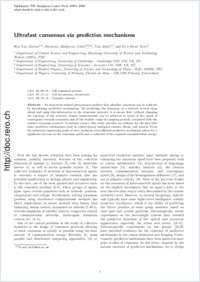Ultrafast consensus via predictive mechanisms
- Zhang, Hai-Tao Department of Control Science and Engineering, Huazhong University of Science and Technology Wuhan, China - Department of Engineering, University of Cambridge, UK
- Chen, Michael ZhiQiang Department of Engineering, University of Cambridge, UK - Department of Engineering, University of Leicester, UK
- Zhou, Tao Department of Modern Physics, University of Science and Technology of China, Hefei, China - Department of Physics, University of Fribourg, Switzerland
- Stan, Guy-Bart Department of Engineering, University of Cambridge, UK
-
06.08.2008
Published in:
- EPL Europhysics Letters. - 2008, vol. 83, no. 4, p. 40003
English
An important natural phenomenon surfaces that ultrafast consensus can be achieved by introducing predictive mechanisms. By predicting the dynamics of a network several steps ahead and using this information in the consensus protocol, it is shown that, without changing the topology of the network, drastic improvements can be achieved in terms of the speed of convergence towards consensus and of the feasible range of sampling periods, compared with the routine consensus protocol. In natural science, this study provides an evidence for the idea that some predictive mechanisms exist in widely-spread biological swarms, flocks, and schools. From the industrial engineering point of view, inclusion of an efficient predictive mechanism allows for a significant increase in the consensus speed and a reduction of the required communication energy.
- Faculty
- Faculté des sciences et de médecine
- Department
- Département de Physique
- Language
-
- English
- Classification
- Physics
- License
-
License undefined
- Identifiers
-
- RERO DOC 11399
- DOI 10.1209/0295-5075/83/40003
- Persistent URL
- https://folia.unifr.ch/unifr/documents/301089
Statistics
Document views: 152
File downloads:
- pdf: 208
